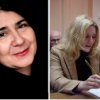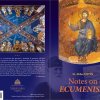Tuesday, November 17, 2015
12:00 pm
Marshall D. Shulman Seminar Room (1219 IAB, 420 West 118th St.)
Please join the Harriman Institute and the Njegoš Endowment for Serbian Language and Culture for a talk by Svetlana Tomić, Alfa University (Belgrade).
Tomić will discuss the historical, political, and literary value of four memoirs by Serbian women: Serbia’s Queen Natalia Obrenović, feminists Savka Subotić and Paulina Lebl Albala, and one of the first professional female teachers Stanka Gišićeva. Their autobiographical works came from different localities, social groups, and ethnicities. They focus on self-representation, women’s lives, and perceptions, and offer valuable insights into Serbian history and society.
Tomić argues that, although women’s memoirs have remained culturally marginalized in Serbia, studying the neglected writings of women opens the possibility for a better appreciation of society and its ability to transform. How do female memoirists contrast with male writers such as Đorđević, Milićević, and Žujović? Can we find contradictions in their confessional dramas and see the motives for their writing? What can we conclude by comparing the writings of men and women from the period when the Serbian nation was formed? How can we generalize the difference and use it as an instrument for a better understanding of social developments not only in Serbia but in the wider Western Balkans region?
Svetlana Tomić is Assistant Professor at Alfa University. She serves as the editor-in-chief of the scholarly journal Reči (Serbia) and is on the editorial board of Serbian Studies. She is a contributor to World Literature Today and other reputable literary and cultural magazines on the Balkans, as well as to the ongoing project of the Croatian Radio (HRT) – The Dictionary of Post Yugoslav Literature.
Source: Harriman Institute
Figuring out the Enemy: Re-imagining Serbian-Albanian Relations
Wednesday, November 18, 2015
4:00 pm
Room 1201 International Affairs Building
Please join the Harriman Institute, the East Central European Center, and the Njegos Endowment for Serbian Language and Culture for a talk with Aleksandar Pavlović, Centre for Southeast European Studies, University of Graz & Institute for Philosophy and Social Theory, University of Belgrade.
Pavlović aims to challenge the Serbian-Albanian hostility by reinvestigating contemporary events and discourses from the past and recent times. In particular, he seeks to identify common views and practices that could deescalate the present enmity and promote cooperation. Starting from the examples of current hostility between Serbs and Albanians in scholarship (Dušan Bataković, Vladimir Stojančević, Đorđe Borozan, Rexhep Qosja, Skender Rizaj, to name but a few), sport (“the drone incident”), media and education (recent dispute about the nationality of Miloš [K]obilić in Serbian and Albanian textbooks and press), he argues that the proper origin of contemporary Serbian-Albanian hostility in the political sense of the word should be traced back to the last quarter of the 19th century. By proper political hostility, he takes Carl Schmitt’s notion of politics as the distinction between friend and enemy that counts with the real possibility of war between two opposed collectives. In order to contend the popular view of the centennial Serbian-Albanian hostility, his enquiry focuses on the different portrayals of their relationship in the oral tradition, early Balkan ethnography and diplomacy, and follows the change in their perceptions from the later part of the nineteenth century onwards. Pavlović hopes to re-affirm common Serbian, Montenegrin and Albanian traditions such as folk oral songs and heroic narratives, which stem from a similar social background and shared patriarchal values among these ethnic groups, or writers and scholars who insisted on the shared values of heroism, hospitality and honor among Serbs, Montenegrins and Albanians.
Source: Harriman Institute
Theorizing Culture of Transition in (Post)-Yugoslav space
Tuesday, November 24, 2015
12:00 pm
Marshall D. Shulman Seminar Room (1219 IAB, 420 West 118th St.)
Please join the Njegos Endowment for Serbian Language and Culture at Columbia University's East Central European Center and the Harriman Institute for a discussion with Marija Grujić and Tatjana Rosić Ilić.
Marija Grujić will give a presentation entitled "Gender, Politics and Urban/Rural Division in Popular Culture in Late Yugoslav/Early Post-Yugoslav Period." The talk illuminates intersections of gender and politics, reflected across the line of urban/rural division in popular culture of late Yugoslav period, and early years of so called post-socialist transition. While the period of the late 1980s, confronted with the early 1990s, was marked by political, social and economic transition, due to the fall of state-socialist system, it occurs that its end has also brought the other turning points and challenges in symbolic representations of gender and politics in popular culture in the region. One of the particular points of reference is exploring how politics of gender representation shaped the understanding of urban/rural divide in films and popular music, and understanding of gender politics which corresponded with the period of crucial political transformations in Europe at the time.
Tatjana Rosić Ilić will present on "Metaphor Of (Lost) Reign: Policies Of Paternity And Post-Yugoslav Cultural Space." Starting from the thesis that concepts of fatherhood are deeply metaphorically related to the concepts of political power the paper discuses new policy of representations of the fatherhood in the context of the post-Yugoslav regional culture of memory. The dynamics of the father-son relationship has always had a very important place in the literary work of Yugoslav writers, especially because of the ideological and social importance which ambivalent father-son relationship has had in the highly masculinist and masculinized culture of the region.
Marija Grujić has received her PhD degree in Comparative Gender Studies at Central European University in Budapest. Her doctoral dissertation explored the close intersection between turbo-folk music, gender representations and post-socialist Serbian national identity. She works as an academic researcher at the Institute for Literature and Art in Belgrade, while she is currently also a visiting research fellow at Freie University Berlin.
Tatjana Rosić Ilić is Associate Professor of writing, literature, gender and media studies at the Faculty of Media and Communications, Singidunum University, Belgrade and research fellow at the Institute for Literature and Arts, Belgrade. Visiting professor at PhD Program at Philological-Art School, Kragujevac University. Current fields of research are critical masculinity studies, post-Yugoslav and Balkan studies, art/literature studies and activism.
Source: Harriman Institute







